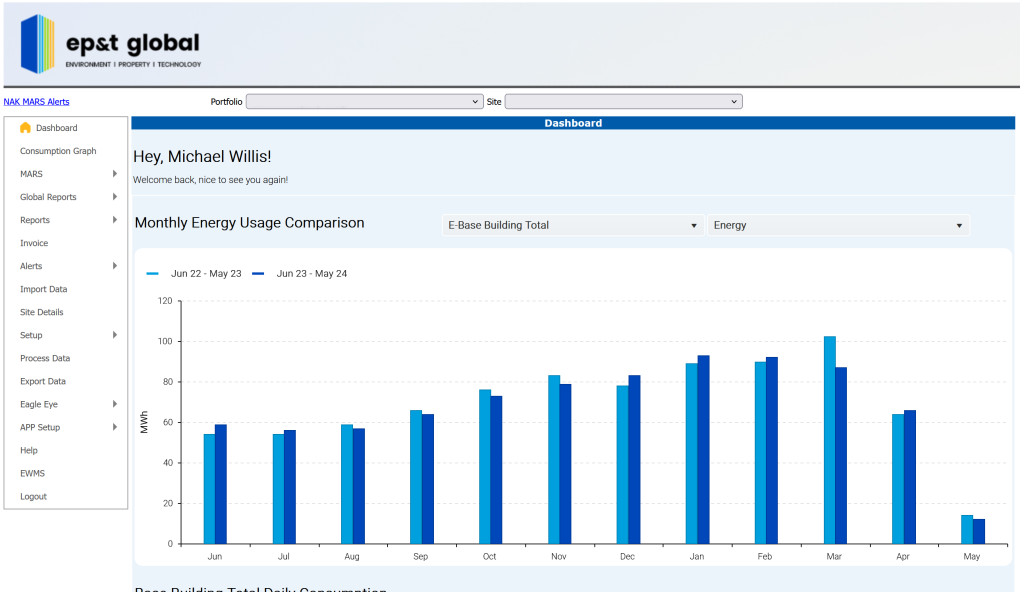Empowering BMS for enhanced performance

Peter White, Head of Global Sales of EP&T Global, discusses how data can highlight the typical challenges encountered during the commissioning of a BMS and explains how by delving into the data, businesses can understand the cascading effects of commissioning flaws and appreciate the need for data-driven decision making.
In commercial real estate, the success of a Building Management System (BMS) hinges not just on the hardware installed but also on the precision of its commissioning and the intelligence behind its operation.
An effectively commissioned BMS slashes maintenance costs and dramatically improves energy efficiency. However, a poorly commissioned system can lead to increased energy consumption and maintenance headaches as a result of sub-optimal performance of crucial building systems like HVAC, compressors and lighting.
Data is at the heart of modern BMS
Commissioning a BMS is a meticulous process that aims to align all systems and components with predefined standards. Despite this rigorous approach, mistakes such as sensor misplacement and incorrect set point configurations are surprisingly common, leading to significant inefficiencies. For example, if a temperature sensor is incorrectly positioned, it could send inaccurate data, causing the HVAC system to operate ineffectively, compromising energy efficiency and occupant comfort.
Our experience with a shopping centre client revealed just how detrimental poor sensor placement can be. The misplacement led to an incorrect set point for the HVAC system, which increased energy use and resulted in uncomfortable indoor temperatures.
However, the impact of these commissioning errors extends beyond immediate discomfort. They increase energy consumption, elevate operational costs, and increase carbon emissions due to the inefficient operation of building assets. Inefficient systems also often require frequent repairs and maintenance, raising costs and exacerbating environmental concerns.
Optimal performance
At EP&T Global, we empower facilities managers and commissioning engineers with access to crucial data through our EDGE platform. Through advanced data analytics, these teams gain insights to quickly identify any installation errors and highlight anomalies, ensuring the BMS is configured for optimal performance.
The data also enables for continuous refinement of the BMS, extending beyond initial commissioning as the real test of a BMS’s efficacy is its ability to adapt and respond to ongoing changes within a building’s environment.
Continuous monitoring through our EDGE platform plays a crucial role in this adaptive process. By providing real-time data and historical analytics, the platform enables facilities managers and commissioning engineers to identify and predict potential issues before they escalate into costly repairs or system failures.
For instance, data and advanced analytics can detect unusual patterns in energy consumption that may indicate a failing HVAC component or an issue with the lighting system before it becomes apparent through traditional means. This proactive approach not only saves on energy but also reduces downtime; enhancing the overall operational efficiency of commercial buildings. Moreover, the ability to analyse trends over time helps make informed decisions about upgrades or changes needed to meet evolving building requirements and environmental standards. Data can also help validate commissioning processes, for example when configuring variable speed drives (VSD) on hot water pumps.

VSDs are critical in adjusting pump speeds to match flow requirements dynamically, promoting energy efficient operations. This method is beneficial in terms of energy savings and enhances the overall longevity and efficiency of the pump systems. Pumps operating at speeds closer to their Best Efficiency Point (BEP) consume less energy, significantly reducing operational costs, extending their lifespan and reducing maintenance costs.
By tweaking VSD settings and optimising the operation of parallel pumps, data validated the improved operation and also the financial savings which was over £120,000 annually at a large entertainment complex. This adjustment effectively covered the financial commitments for major operational areas without capital expenditure (capex), highlighting the immediate benefits of using data to identify and validate to optimise both new and existing systems.
Encouraged by the substantial savings and operational improvements at the initial site, the strategy was rolled out across multiple locations in the UK region. Each implementation and the data validation further demonstrated that most commercial buildings with VSDs could achieve similar efficiencies, suggesting a widespread opportunity for energy and cost savings across the industry.
Lessons learned
As the commercial real estate sector continues to focus on sustainability, the lessons learned from these implementations underline the importance of embracing innovative data-driven solutions that can help identify opportunities to significantly reduce operational costs and environmental impact.
Data-driven insights provide continuous insights to ensure that building systems do not just perform as intended initially but continue to operate at peak efficiency throughout their lifecycle. This ongoing optimisation process is vital for maintaining high standards of energy efficiency, reducing operational costs and minimising the environmental footprint of buildings.
Navigating the complexities of a BMS requires a comprehensive approach that leverages data visibility and innovative solutions to maintain optimal operations. By
empowering stakeholders with the right tools and information, we are setting the stage for a future where building management is about maintaining the status quo and pushing the boundaries of what is possible in energy efficiency and operational excellence.
Looking ahead, the future of BMS commissioning lies in harnessing the power of data to drive efficiency and sustainability initiatives within the commercial real estate industry. Advanced data analytic solutions are leading the charge in this area, paving the way for more sustainable and efficient building management practices. As the industry continues to prioritise these goals, the role of that data play for commissioning teams will only grow in significance.







